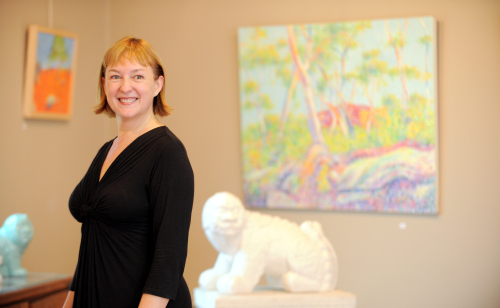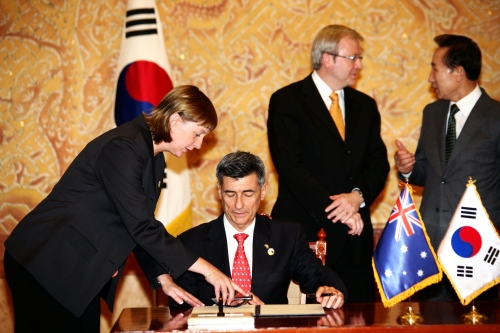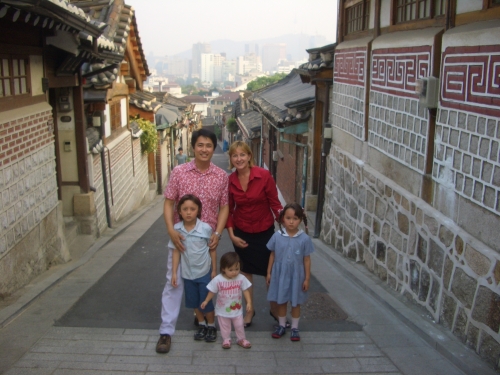Australian ex-diplomat takes initiative to develop wellness in Korea
PAJU ― Coming from spacious, outdoors-loving Australia, Mary-Jane Liddicoat craved greenery and wide open spaces when she arrived in Seoul in 1999.
Now 12 years on, she has all that and much more, due in part to her proactive approach to creating a happy and productive living environment.
At her second home amid Paju’s lush green fields, with high-beamed ceilings extending up from large rooms adorned with paintings and sculptures, Liddicoat met The Korea Herald to talk about her work here as a diplomat-turned-life coach.
“What I love about Korea is that it’s always changing and they’re always looking to do something better and more people-friendly. And that’s kind of where I’m functioning from now,” said the 46-year-old.
 |
Mary-Jane Liddicoat at her home in Paju. (Kim Myung-sub/The Korea Herald) |
Cross-country ties
Liddicoat initially came here as a Korean language trainee, a requirement before she could take a diplomatic position with the Australian Embassy here.
Working as first secretary (political) from 2001-04, she helped introduce the Australian preferential voting system ― where the winning candidate must receive more than 50 percent of the vote ― to Korea.
Used in the country’s 2001 primaries, this enabled Roh Moo-hyun, an outside contender, to be elected as a Millennium Democratic Party presidential candidate and ultimately as president.
After her term finished, she spent a year at home in Sydney before taking the rare step of a second posting in Korea ― this time as a counselor (education).
She found this particularly enjoyable due to the country’s commitment to education. A highlight for her was being involved in the 2008 Memorandum of Understanding between President Lee Myung-bak and Australia’s prime minister at the time, Kevin Rudd, for educational cooperation between the two countries.
Liddicoat’s goal had always been to strengthen ties between Australia and the country she was working in to mutually improve conditions for citizens.
Having held diplomatic positions in Syria, Japan and finally Korea, she concluded that she had gone as far as she could in terms of encouraging change as a government representative.
She decided she now needed to change people’s mindsets, to help create a better environment for her expanding Korean-Australian family. She met her Korean husband on a mountain biking tour and together they have three children aged 2, 6 and 8.
“Korea’s (been) incredibly successful, in the last 40, 50 years at becoming a prosperous country. There’s a great wealth, a national wealth; an intellectual and educational wealth.
“Now what would it take for people to have personal abundance in satisfaction with their lives?”
To find out, she became a certified facilitator in Managed Wellness. The training was in Access Consciousness, a set of mental tools introduced in the U.S. in the early ’90s and designed to build awareness to enhance quality of life.
 |
Liddicoat assists the Australian Ambassador Peter Rowe at the official signing ceremony of the educational cooperation MOU between Australia and Korea, with President Lee Myung-bak and former Australian Prime Minister Kevin Rudd at the Blue House in 2008. (Australian Embassy in Korea) |
Choosing personal wealth
In an OECD country where long working hours, high suicide rates and low global happiness index scores are cause for concern, she set about creating her own feel-good revolution in Korea.
Her aim was to improve wellbeing by encouraging people to make decisions based on what is right for them, not what society tells them is right, and also to be open to different possibilities.
“It’s about just being clear on what it is that you would really like to have as your life and then just being aware of those choices you can keep making to create that,” she said.
“And that’s where I get the feeling that the sense of choice, true personal choice doesn’t really exist for a lot of people yet,” she said, illustrating this by explaining that many are afraid to divert from the mainstream life course of going to a top university, working for a conglomerate, before settling down with a spouse and a child.
She would like to see a change in values articulated through a framework extending throughout society. She is especially keen in the realm of education, an area of personal interest to her as a mother and due to her work on it in the diplomatic service.
“When I talk to people I always just plant little ideas in their heads. Whether they act directly on it or not, I don’t know. But I don’t really mind. The change I’ve seen (since she arrived) has been incredible.”
Her work in Seoul is mostly through www. conscious-living.asia and based at New York Wholistic Care clinic in Itaewon, Seoul. There she provides individual counseling sessions as well as workshops designed to help people lead happier, healthier lives.
“It’s being present with the person to empower them. Through asking questions, empowering them to know what they probably already know,” she explained.
“They may know it very easily or they may not know it for some time.
So what difficulties is this treatment meant to address?
“It’s really anywhere that you want to make a change,” she said, adding that when you realize something is true, it should make you feel lighter.
For instance, she explained, if considering becoming a vegetarian you should look not only at information readily available but also at other, more hidden details that may change the picture.
You then make a choice based on this about what is “true” for you. If answering negatively to the question “Do you want to eat meat?” makes you feel heavy, then becoming a vegetarian may not be right for you.
She presents information gleaned from her training, research and in particular prominent author in the field Philip Day ― whose work she is striving to have translated into Korean ― on her Healthy Homes Asia website. It includes details about chemicals used in everyday products such as toothpaste and cosmetics, and nutritional advice.
“Once you know about this stuff I’m not saying worry. Just be aware and then choose things that are going to nurture you. It’s about being aware of where there’s missing information,” said Liddicoat.
The Question Shop is another endeavor. Merchandise available on the site, such as mugs and T-shirts, features questions including “What’s right about this that I’m not getting?” and “What else is possible?” to prompt people to be more self-aware and find the value in difficult situations.
Liddicoat is very enthusiastic about her current work, but perhaps most of all with her appearance as a regular guest on TBSeFM’s Family Affairs radio show. She can be heard discussing topics such as how to deal with child discipline.
“To me it’s just a brilliant vehicle to reach more Koreans … to bring them to that awareness that something even greater is possible, in health and happiness and prosperity.”
“There’s so much focus on prosperity. Well, ‘Truth: Does money bring you happiness?’ I’m not saying don’t have money but ‘what if you could have money and be joyful every day?’”
In the future she hopes to surmount her fears of presenting the show using her Korean language skills.
She is adamant that she does not want to tell people what to do, but would like her insights to help people make more beneficial decisions for their own lives. And if not, she respects that.
The future’s bright
Liddicoat’s base in Seoul, Bukchon, is a special place for her. In 2008, whilst still a diplomat, she asked permission from her embassy to set up www.hanokgirl.net to promote the area and its historic traditional Korean homes.
At the time it was only popular with Japanese tourists, due to the popular drama “Winter Sonata” being filmed there. Now, thanks to Liddicoat’s promotion and consequent government efforts, the area is now a tourist destination.
Through this, she was invited to meet with the current mayor of Seoul Oh Se-hoon, and was thrilled to have the opportunity to discuss opportunities with him for tourism development here.
Although she doesn’t live in a hanok herself, she has great affection for the area and says it has a good atmospheric “energy.”
Not only does Liddicoat live in a haven for creativity ― the streets of Bukchon are peppered with intriguing galleries ― she also has art running in the family.
 |
Liddicoat with husband Choi Jin-ho and her children in Bukchon, Seoul. (Courtesy of Mary-Jane Liddicoat) |
She is married to sculptor Choi Jin-ho, who designed Seoul’s emblem of the lion-like mythical Haechi, and her father is also an artist. The two collaborated together in the exhibition “Kimchi meets Vegemite.” Liddicoat helps them promote artistic exchange between Korea and Australia.
Whilst she has plenty to keep her busy in Korea, Liddicoat hopes to see further development before she considers putting her three children through the rigors of Korea’s notoriously intense education system.
She envisions a school akin to the U.K.’s progressive Summerhill School in Suffolk, but run for bilingual students. International schools here, she said, are prohibitively expensive.
With Liddicoat brimming with positivity, ideas and motivation, perhaps that is not out of the question.
She is reluctant to state her proudest professional achievement ― as it would preclude her from exceeding that ― but she seems more than content where she is right now.
“What I truly believe the biggest contribution I have and can be is to be me, creating the light, happy, enjoyable, nurturing, rewarding-for-everybody-Korea that I can which includes what I’m doing now.”
Mary-Jane Liddicoat
•1999-01 ―Advanced Korean, U.S. State Department of Foreign Service Institute, Seoul
•2000-04 ― First secretary (political), Australian Embassy, Seoul. Helped introduce Australian preferential voting system to the Millenium Democratic Party
•2006-09 ― Counselor (education), Australian Embassy, Seoul 2008-present ― Runs www.hanokgirl.net to promote Bukchon to tourists
•2009-10 ― Director, Board of Australian Chamber of Commerce
•2010 ―Voluntary Korea head of LOHAS (Lifestyles of Health and Sustainability) resulting in an Asia-Pacific and Korea LOHAS partnership
•2010-present ― Became certified facilitator of Managed Wellness, Access Consciousness. Founded and runs Conscious Living, Conscious Leadership Asia-Pacific, Healthy Homes Asia, The Question Shop
•2010-present ― Regular guest on TBSeFM show Family Affairs
By Hannah Stuart-Leach (
hannahsl@heraldcorp.com)







![[Exclusive] Hyundai Mobis eyes closer ties with BYD](http://res.heraldm.com/phpwas/restmb_idxmake.php?idx=644&simg=/content/image/2024/11/25/20241125050044_0.jpg)
![[Herald Review] 'Gangnam B-Side' combines social realism with masterful suspense, performance](http://res.heraldm.com/phpwas/restmb_idxmake.php?idx=644&simg=/content/image/2024/11/25/20241125050072_0.jpg)

